|
|
|
Sort Order |
|
|
|
Items / Page
|
|
|
|
|
|
|
| Srl | Item |
| 1 |
ID:
175123
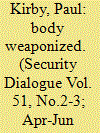

|
|
|
|
|
| Summary/Abstract |
It is today common to argue that rape is a weapon, tool or instrument of warfare. One implication is that armed groups marshal body parts for tactical and strategic ends. In this article, I interrogate this discourse of embodied mobilization to explore how body weaponry has been made intelligible as a medium for sexual violence. First, I show that, despite wide rejection of essentialist models, the penis and penis substitutes continue to occupy a constitutive role in discussions of sexual violence in both political and academic fora, where they are often said to be like weapons, a tendency I term ‘weapon talk’. Second, I trace the image of the body weapon in key threads of feminist theorizing and commentary, to show how the penis has appeared as a ‘basic weapon of force’ in various permutations. Third, I explore the weaponization of the body as it appears in military thought and in the cultural circulation of ideas about the soldiering body in which sexual pleasure and violence are frequently conflated. Building on this foundation, I propose that these literatures collectively describe an uncanny weapon object, and I draw out the significance of this term for feminist security studies and martial empiricism. In short, the uncanny haunts accounts of sexual violence in the collision of sexuality and machinery in the image of a body weapon, in the unsettling designation of sexuality as itself both familiar and dangerous, and in the strange movement of violent bodies across the boundary between wartime and peacetime. A concluding discussion draws out implications and challenges for thinking about embodied violence, advocating renewed attention to the history of weaponization as a fallible and confounding process.
|
|
|
|
|
|
|
|
|
|
|
|
|
|
|
|
| 2 |
ID:
138944
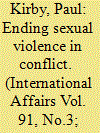

|
|
|
|
|
| Summary/Abstract |
During the past year, the UK Government has become the lead advocate for a perhaps surprising foreign policy goal: ending sexual violence in conflict. The participation of government representatives from more than 120 countries in a London Summit in June 2014 was the clearest manifestation of this project. This article offers an early assessment of the Preventing Sexual Violence Initiative (PSVI) and situates it within the history of global action against sexual and gender-based violence from UN Security Council Resolution 1325 onwards, with a particular focus on three key developments. First, the PSVI has embraced the already common understanding of rape as a ‘weapon of war’, and has stressed the importance of military training and accountability. This has exposed the tensions within global policy between a focus on all forms of sexual violence (including intimate partner violence in and out of conflict situations) on the one hand, and war zone activities on the other. Second, the Initiative has placed great emphasis on ending impunity, which implicates it in ongoing debates about the role of international and local justice as an effective response to atrocity. Third, men and boys have been foregrounded as ignored victims of sexual and gender-based violence. The PSVI has been crucial to that recognition, but faces significant challenges in operationalizing its commitment and in avoiding damage to existing programmes to end violence against women and girls. The success of the Initiative will depend on its ability to navigate these challenges in multiple arenas of global politics.
|
|
|
|
|
|
|
|
|
|
|
|
|
|
|
|
| 3 |
ID:
145279
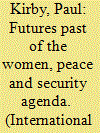

|
|
|
|
|
| Summary/Abstract |
The Women, Peace and Security (WPS) agenda has developed at the United Nations over the course of the past 15 years, and there have been critical engagements with it for nearly as long. In this article, we first take stock of the operationalization of the WPS agenda, reviewing its implementation across a number of sectors. In the second section, we expose the tensions that have marked the WPS agenda from the start. With others, we argue that there has been a narrowing of the agenda's original scope, reducing it to the traditional politics of security rather than reimagining what security means. We highlight this reduction primarily through an analysis of the tension between the ‘participation’ and ‘protection’ pillars of the agenda. Further, we argue that the WPS agenda faces a current challenge in terms of the actors entrusted with it. Although in some ways involving civil society, the consolidations and implementation of WPS principles at the national and international levels have become increasingly state-centric. Third, we imagine some possible futures of the agenda, from a trajectory characterized by increasing marginalization or even irrelevance, to new avenues like the emergent, albeit tentative, ‘Men, Peace and Security’ agenda. We close with an argument for a revival of the WPS agenda beyond a fixation on states, beyond a narrow heteronormative or essentialist focus on the ‘Women’ of the WPS resolutions, and moving towards the radical reimagining of security as peace that inspired the original architects of these important resolutions.
|
|
|
|
|
|
|
|
|
|
|
|
|
|
|
|
| 4 |
ID:
157536
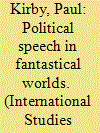

|
|
|
|
|
| Summary/Abstract |
This article concerns the relationship of politics to speculative and fantastical fiction. Surveying work on aesthetics, media analysis, and science fiction (SF) in the discipline, it also seeks to disjoint some common understandings of how politics is found in cultural artifacts by showing that much IR analysis of SF has opted for a reductionist reliance on analogical readings. To do so, the article first sets out the status of the SF genre, and related fields such as fantasy. The case is here presented with greater ambition than is usually the case, paying particular attention to utopia, and arguing for a view of SF as part hinterland of political theory. In the second part, the underlying rationale for pop cultural analysis is revisited, and some standard motifs in the study of SF recapitulated, the better to revise critical common sense. Having expanded the field of inquiry, a third section demonstrates the limits of analogical analysis as currently practiced. The article then elaborates and defends a new distinction between programmatic and expressive sensibilities in SF to revive the case for a more ambivalent and open reading of SF. Having mapped the current limits of pop-cultural IR, and offered a somewhat different cartography, a final section draws out some implications for methods and future discussion.
|
|
|
|
|
|
|
|
|
|
|
|
|
|
|
|
| 5 |
ID:
145272


|
|
|
| 6 |
ID:
174632
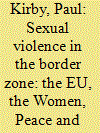

|
|
|
|
|
|
|
|